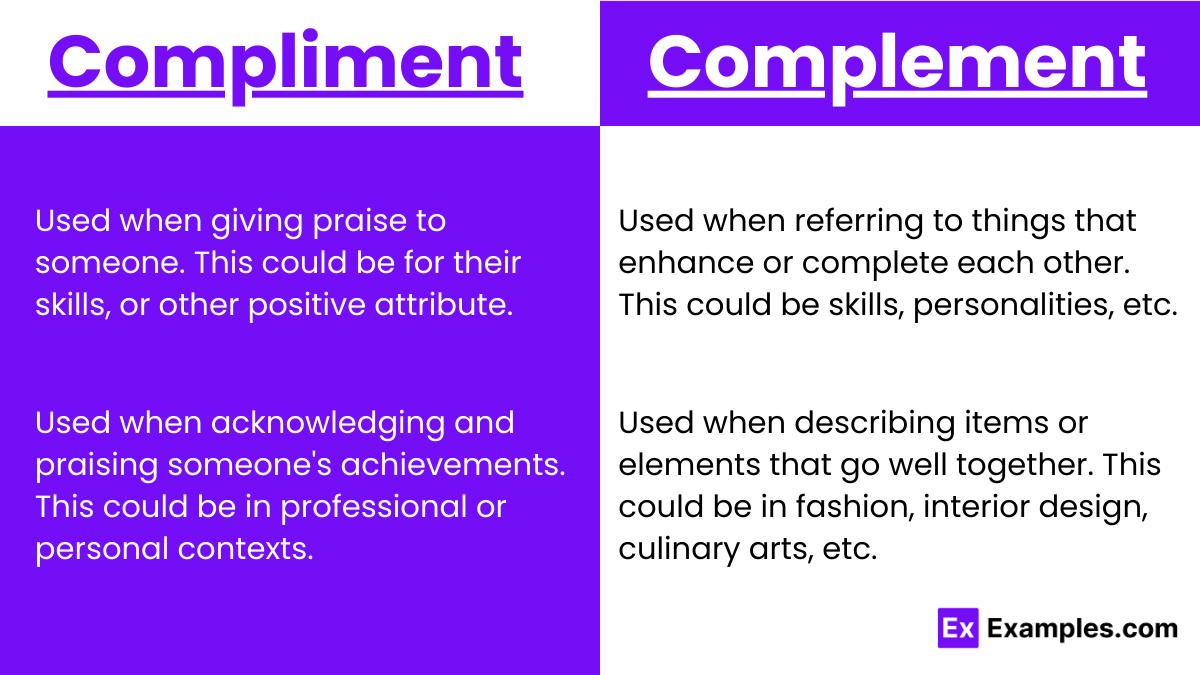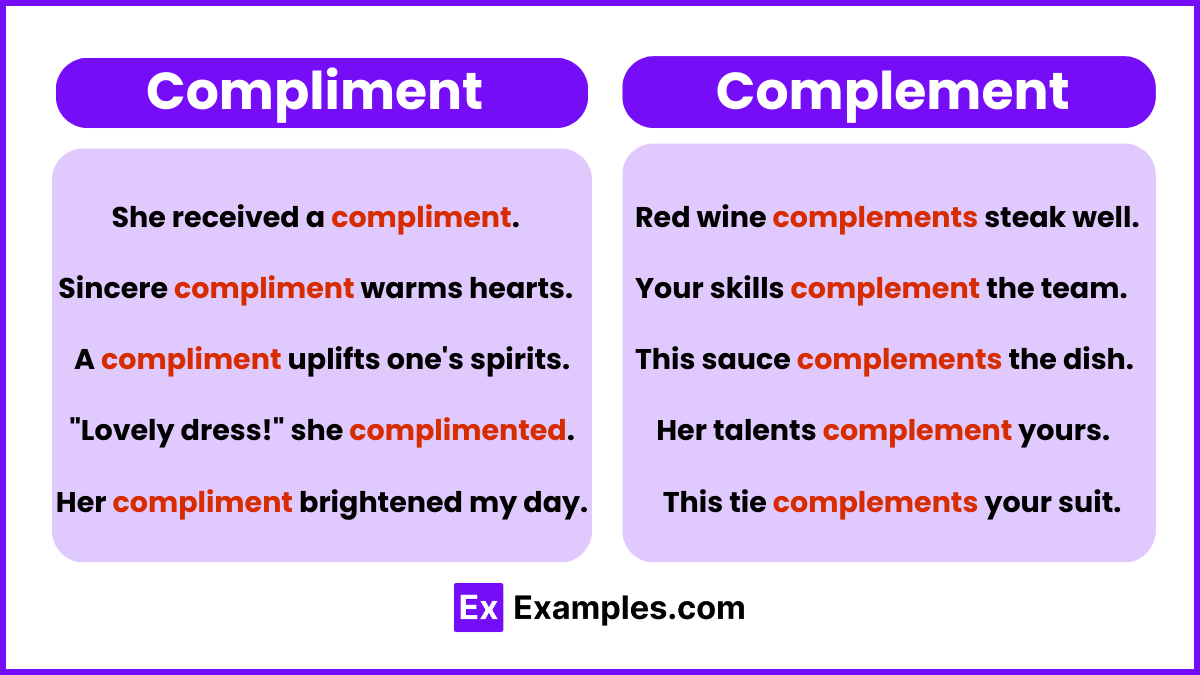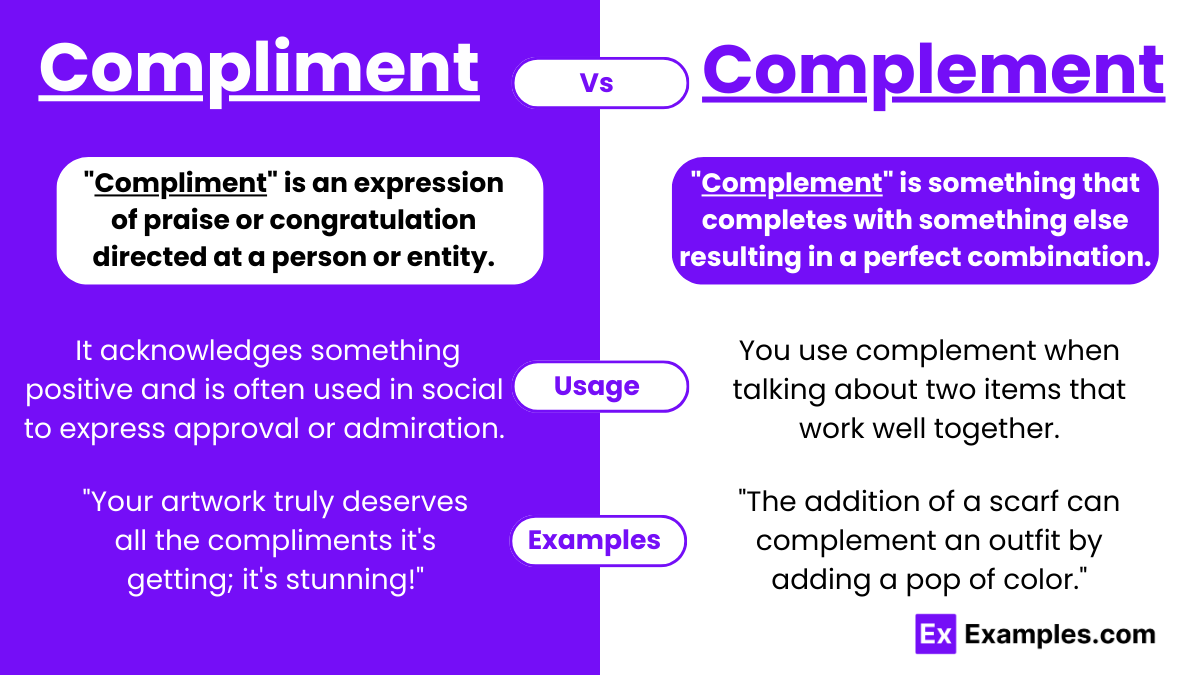Compliment vs Complement – Difference, Meanings, Examples, Usage
We often stumble upon words that sound alike but carry different meanings. Two such words are “compliment” and “complement,” both springing from the Latin root “complēre,” meaning “to complete.” While “complement” directly derives from this root, reflecting the idea of completion or enhancement, “compliment” took a more scenic route through various languages, evolving to express politeness or praise. These terms frequently find themselves tangled in confusion, yet understanding their distinct paths and purposes can clear the fog, ensuring they no longer perplex us. Let’s demystify these words and make them allies in our vocabulary, not sources of confusion.
Compliment and Complement – Meanings
- Compliment: A “compliment” is an expression of praise, admiration, or congratulation directed at a person, group, or entity. It acknowledges something positive and is often used in social, personal, and professional interactions to express approval or admiration.
- Complement: “Complement” refers to something that completes, enhances, or goes well with something else, often resulting in a perfect combination or improvement. It can relate to objects, individuals, or abstract concepts, emphasizing the harmonious relationship between different elements.
Summary
A compliment is a kind expression or praise given to someone to show admiration or approval. For example, telling someone they did a great job on a presentation is giving them a compliment. On the other hand, complement refers to something that completes or goes well with something else, enhancing its qualities. For instance, a tie that complements a suit makes the outfit look complete and more attractive. Remember, “compliment” with an “i” is about admiration, while “complement” with an “e” is about completing or enhancing.
How to Pronounce Compliment and Complement
- Compliment: Pronounced as /ˈkɒmplɪmənt/ (kom-pli-ment).
- Complement: Pronounced as /ˈkɒmplɪmənt/ (kom-pli-ment).
Despite having the same pronunciation, the context in which they are used clearly distinguishes their meanings.
Differences between Compliment and Complement
| Aspect | Compliment | Complement |
|---|---|---|
| Connotation | Positive; expresses praise or admiration. | Neutral or positive; indicates enhancement or completion. |
| Usage | To acknowledge or praise someone’s qualities or achievements. | To indicate that something enhances or completes another. |
| Example Context | “She received a compliment on her eloquent speech.” | “The wine was a perfect complement to the cheese.” |
| Temporal Reference | Not applicable. | May imply a synergy that evolves over time. |
| Effect on Reader/Listener | Generates a sense of appreciation or validation. | Suggests harmony, completeness, or enhancement. |
| Nuance in Sentence | Focuses on the positive attributes or actions of someone or something. | Emphasizes the mutual enhancement of two or more elements. |
How to Remember the Difference between Compliment and Complement
To distinguish “compliment” from “complement,” remember that “compliment” with an “i” involves individual praise, whereas “complement” with an “e” entails elements that enhance each other. Associating the “i” in “compliment” with “individual” and the “e” in “complement” with “enhance” can aid in recalling the correct usage.
When to Use Compliment and Complement

Usage of Compliment
- Use “compliment” when giving praise or admiration to someone. This could be for their appearance, skills, behavior, or any other positive attribute.
- Use “compliment” when expressing appreciation or gratitude. You might compliment someone for their help, support, or kindness.
- Use “compliment” when acknowledging and praising someone’s achievements. This could be in professional or personal contexts.
- Use “compliment” when expressing admiration for something well done or created. This could be artwork, a meal, a project, etc.
Usage of Complement
- Use “complement” when referring to things that enhance or complete each other. This could be colors, flavors, skills, personalities, etc.
- Use “complement” when describing items or elements that go well together. This could be in fashion, interior design, culinary arts, etc.
- Use “complement” when talking about things that harmonize or balance each other. This could be in relationships, compositions, arrangements, etc.
- Use “complement” when discussing how one thing adds value or enhances the qualities of another.
How to use Compliment and Complement
Compliment
How to Use: You give a compliment when you tell someone they look nice today, or when you praise someone’s work. For example, “I complimented her on her beautiful dress.”
- Expressing Praise: “She received a compliment for her innovative design.”
- Acknowledgment: “His teacher gave him a compliment on his improvement.”
- Social Interactions: Used in dialogues and interactions to convey admiration (“That’s a nice compliment!”).
Complement
How to Use: You use complement when talking about two items that work well together, like saying, “Her scarf complements her outfit.” It means the scarf and the outfit make a good combination.
- Enhancement: “The sauce is a perfect complement to the dish.”
- Compatibility: “Their skills complement each other well in the project.”
- Completeness: “The two colors complement each other, creating a harmonious palette.”
Compliment and Complement – Examples

Examples of Compliment
- “Your artwork truly deserves all the compliments it’s getting; it’s stunning!”
- “He blushed when his crush complimented him on his new haircut.”
- “The chef came out to our table after we sent a compliment to the kitchen for the exquisite meal.”
- “I must compliment you on your excellent presentation; it was both informative and engaging.”
- “Receiving a compliment from someone I admire so much means the world to me.”
Examples of Complement
- “The subtle lighting in the room complements the decor perfectly, creating a warm ambiance.”
- “Her skills in negotiation complement his expertise in strategy, making them a formidable team.”
- “This wine perfectly complements the flavors of the cheese platter.”
- “The addition of a scarf can complement an outfit by adding a pop of color or texture.”
- “The piano music in the background complemented the evening’s serene atmosphere beautifully.”
Synonyms
| Compliment | Complement |
|---|---|
| Praise | Enhancement |
| Flattery | Addition |
| Admiration | Supplement |
| Kudos | Counterpart |
| Accolade | Accompaniment |
Exercise
- She received many ________ on her performance.
- The herbal tea is a perfect ________ to the spa experience.
- His kindness was a great ________ to her sincerity.
- I want to ________ you on your dedication.
- The book and the movie are perfect ________ to each other.
Answers
- compliments
- complement
- complement
- compliment
- complement
FAQ’S
What is the difference between compliment and complimentary?
“Compliment” refers to praise or admiration, while “complimentary” means free of charge or expressing a compliment.
Does complement mean praise?
No, “complement” doesn’t mean praise. It refers to something that completes or goes well with another.
How to remember the difference between complement and compliment?
Remember: “I” in “compliment” for admiration, and “E” in “complement” for enhancement.
What is an example of complement and compliment?
Complement: Red wine is a perfect complement to steak. Compliment: She received a compliment on her eloquent speech.
How do you use complement and compliment in a sentence?
Complement: These shoes perfectly complement your outfit. Compliment: He gave her a compliment on her cooking.
What is a complement in a sentence example?
In the sentence “Her skills are a great complement to the team,” “complement” means her skills enhance the team well.


